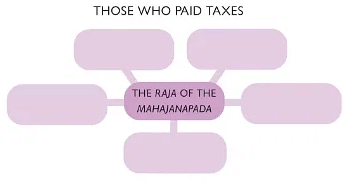NCERT Solutions for Class 6 History - Kingdoms, Kings and An Early Republic
| Table of contents |

|
| Let’s Recall |

|
| Let’s Discuss |

|
| Let’s Do |

|
| KeyWords |

|
Let’s Recall
Q1. State whether true or false:
(a) Rajas who let the ashvamedha horse pass through their lands were invited to the sacrifice.
Ans: True
(b) The charioteer sprinkled sacred water on the king.
Ans: False
(c) Archaeologists have found palaces in the settlements of the janapadas.
Ans: False
(d) Pots to store grain were made out of Painted Grey Ware.
Ans: False
(e) Many cities in mahajanapadas were fortified.
Ans: True
Q2. Fill in the chart given below with the terms: hunter-gatherers, farmers, traders, crafts persons, herders.
 Ans:
Ans:
- Farmers: Gave one-sixth of the produce to the state
- Crafts persons: Contributed to labour
- Herder: Contributed in the form of animal produce
- Traders: Stimulated commercial activity by buying and selling goods
- Hunter-gatherers: Would provide forest produce such as elephants, furs and other items as a tribute
Q3. Who were the groups who could not participate in the assemblies of the ganas?
Ans: Women, dasas, kammakaras are the groups who could not participate in the assemblies of the ganas.
Let’s Discuss
Q4. Why did the rajas of mahajanapadas build forts?
Ans: The rajas of mahajanapadas built forts to defend their capital city from attacks by other rajas. It is also said that they wanted to show how rich and powerful they were by building large and powerful walls. The more practical reason could be that it was easier to govern fortified cities.
Let’s Do
Q5. Were there any janapadas in your state? If yes, name them. If not, name the janapadas that would have been closest to your state, and mention whether they were to the east, west, north or south.
Ans: The answer is subjective to the region and area you live in. Take the assistance of your subject teacher and the map given on page 57 in the textbook to prepare your answer.
Q6. Find out whether the groups mentioned in answer 3 have voting rights.
Ans: Today, voting rights are not decided by gender or profession. Women, ‘kammakaras’ and ‘dasas’ were not entitled to attend assemblies in the older days.
KeyWords
- Raja: A ruler or king in some South Asian cultures.
- Ashvamedha: An ancient Vedic ritual involving the sacrifice of a horse, symbolizing royal power and authority.
- Varna: A social class or caste in Hindu society, often associated with a person's occupation.
- Janapada: An ancient Indian term referring to a territorial unit, often translated as "country" or "region."
- Mahajanapada: A more significant and powerful Janapada, representing a larger and influential territory in ancient India.
- Fortification: The process of strengthening a place with defensive structures, like walls or military installations.
- Army: A large organized group of armed forces led by a commander, trained for warfare.
- Tax: Money paid by individuals or businesses to the government to support public services and infrastructure.
- Transplantation: The process of moving an organ, tissue, or living cells from one place to another, often in medical procedures.
- Gana or Sangha: An assembly or group, typically used in the context of ancient Indian republics or political organizations.
|
297 videos|1066 docs|204 tests
|
FAQs on NCERT Solutions for Class 6 History - Kingdoms, Kings and An Early Republic
| 1. What were the major kingdoms in ancient India? |  |
| 2. Who were the important kings during the early republic in India? |  |
| 3. How did the early republic function in ancient India? |  |
| 4. What were the major sources of power and authority for the kings in ancient India? |  |
| 5. What were the key characteristics of the early republic in ancient India? |  |
















